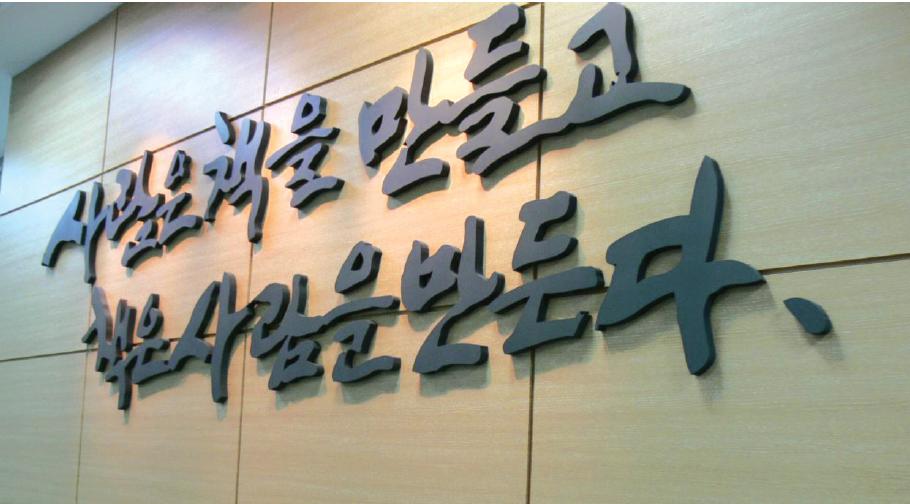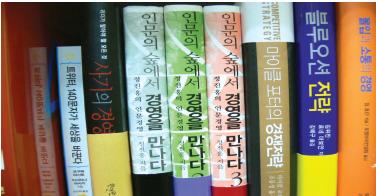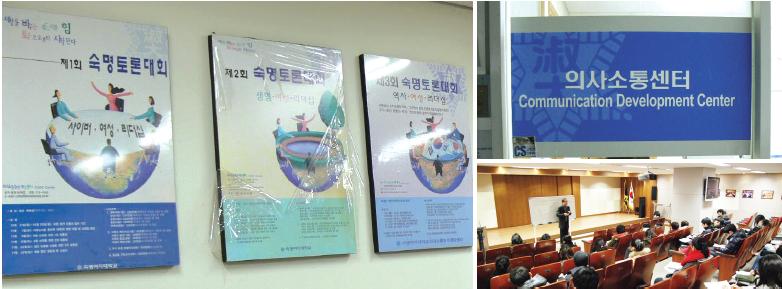
Michael Crichton wrote in the novel Time Line, “Human made an incredible scientific achievement for the last 2 centuries, but the studies of humanities stays at the level of medieval time.” This sentence shows Korean societies current situation. Not long ago, the crisis of humanities was an important social issue. However, now, quite a few things have changed. Liberal arts books are on the bestseller bookshelves, big companies’ CEOs argue that ‘humanities management’ is needed, and you can easily find simple fun humanities courses for general people. On the other hand, the faces of humanities scholars aren’t that bright, because, as always, where there is a bright side; there is always a dark side together.
Turned Its Life around
The crisis of humanities is no more than a past story. Nowadays, it’s not an exaggeration that our society is in the humanities fever. Firstly, ‘What is Justice?’ ranked first, in the 2010 Yearly Bestseller ranking. According to Kyobo Bookstore, since the open of the Kyobo Bookstore in 1981, it is the first time that a liberal arts’ book ranked first. They said, “Thanks to the popularity of ‘What is Justice?,’ attention to books related to philosophy, history, and society have increased high.” ‘What is a Justice’ made a big success in our society, liberal arts books like ‘23 things They Don’t Tell About Capitalism,’ and ‘Period of Sympathy’ are also gaining popularity.
Ironically, the field where humanities is in the limelight is the business field. The beginning of this is Steve Jobs’ humanities admiration. When he presented the release of the i-Pad, he mentioned the importance of the humanities. “The reason that Apple is able to create products like i-Pad is because we always try to be at the intersection of technology and liberal arts, to be able to get the best of both,” Also, he said “Liberal arts made me realize that technology exists not for itself but human beings, and that technology should be easy and fun to use.” After his announcement, many companies and CEOs are participating in this humanities fever. The CEO of Shinsegae group said that he finds the answer of the problem in liberal arts books. POSCO group holds liberal arts courses once a month for employees. Also, recently, Park Won Soon, Board Of The Beautiful Charity, ran a course about classics. Participation of businessmen was very high.3
Humanities, Too Light for Me
On surface, it seems like humanities are receiving people’s attention, but under the surface, there still exists some problem. The problem is that humanities which are earning great popularity in our society are not real humanities, but changed ones. Many companies and businessmen are emphasizing the importance of humanities, but in their humanities, it is not more than a new method for improvement of managing companies and productivity. It is the same situation in courses running from a local government or department store. It looks beautiful, but actually, these humanities are bent toward popularity. Many humanities courses end up making certain rich people’s community. Jung Yoon Soo, cultural critic said, “In the past, desire of middle-class people; to live like a high-class, appeared as taking lessons in flower arrangement, but now, as a nouveau-middle-class culture, humanities courses are consumed by being beautifully ‘photoshopped.’ This is what we should worry about.”4 These courses are taught in several districts where rich people are living, and make people who go to the department stores, think themselves ‘luxurious.’ By making customers think like this, humanities courses are helping department stores to earn more money.5
University is not that different. Still, humanities are majors which are less preferred than other majors, and most of the students who major in humanities try to double major in practical studies. Also, in most universities, the most popular subject is definitely Business Administration. Liberal arts education of university emphasizes language education. Lee, who is in the college of Liberal Art, said, “In the college of Liberal Art, at least graduating in language is better than graduating in philosophy or some unworthy study.” English Reading and Writing Professor Kim said, “Although I want to discuss some serious problems and hear considerate students’ ideas, I can’t. Students just don’t like it. All they want is to get a good grade and prepare for exams.”
Reason of Life
Deep inside this social condition, there lies people’s biased viewpoint to humanities. Even though humanities have suddenly become popular, the deep consideration about human is still not there. Humanities have become study that ignores the problems of our real life and has become the tool of improvement of managing companies and productivity. Rather than that, humanities have degenerated into a method of showing off and earning money. In our society, the idea that humanities are unworthy studies is prevalent. Choi, Yonsei University sophomore said, “When I applied to my university, I told my mom that I wanted to study history at university. My mom’s response was, “What in the earth are you going to do in the future after graduating in history?” So finally I applied in Division of Business Administration.” Even though the university is where people truly study for achieving an academic goal, this is Korea’s current situation. The root of this concept comes from mammonism. The president of the Korean Association for Studies of Philosophical Thought said, “ The crisis of Humanities comes from negligence of psychological value; which is caused by mammonism.”6 In mammonistic society, everything is measured by its economical value. Something that can’t show immediate economical profit is considered unworthy and looses people’s interest.
Humanities are literally studies about humans. The negligence to humanities means money and materials are considered more important than humans themselves. This is to mistake means for ends. The world needs balance. If one part is strong, we need to strengthen the weaker part. Like current Korean society, if people’s obsession and competition toward wealth is strong, we need to strengthen morality and consideration. If we can make balance, then our society can be a balanced and harmonious society. How can we make the balance, then? The answer is humanities. Through humanities, we can learn the meaning of the existence of humans, wisdom of life from the past, and the power to solve current vague situations. Kyungbook National University professor Lee Kang Eun said, “Humanities has its future, only when we bring a focus on people’s lives which were ignored in the process of capitalism and find the right path for integration of human and capital.”7

Finding Real Humanities
Fortunately, there is a movement to find real humanities. Some people made a group which seeks the meaning of life by reading books and using it to help others. The Reading College-Renai 21 is pushing forward with The Clemente Course In The Humanities. It is a public works project which provides books and reading manuals made by specialists to low-income families’ teenagers. Father Kim Han Seung, said, “If children realize the reason to live by reading humanities books, they won’t surrender to their hard circumstances. Humanities books will help them have self-esteem and get ready for the future.”
Another visible movement can be found in universities. For example, in the case of Kyunghee University, they made a new course of ‘Humanitas College’ for putting importance on liberal arts education. The final goal of ‘Humanitas College’ is by reinforcement of liberal arts education, broadening the understanding people’s lives and realizing the value of community. Kyunghee University’s movement is different from others because it is not using humanities to earn money, but started from reflection of current university education. SMU is participating in this movement, also. In SMU, there is a communication center separately, and there is effort to emphasize liberal arts. They made several courses, compulsory for graduating from the university. In the first grade, students should attend the Reading and Writing and Presentation and Discussion. Especially, in the Reading and Writing classes, students must read liberal arts classics and think deeply about this. Kim, freshman of SMU, said, “At first, it was quite annoyed to read all these hard and difficult books. However, after this class, I realized that it was quite helpful in thinking deeply.” Also, SMU holds discussion competition and book report competition.
Worthy Itself
For sure, when thinking about the humanities crisis of several years ago, it is really a good phenomenon that many people like humanities and have re-spotlighted them. However, the most important problem of current humanities fever is that there is no core idea of humanities. Many people are using humanities for making money. Humanities are literally study about humans and starts from fundamental questions about human life. Its role is making possible critical introspection of capitalistic society and showing the way to find the solution. When people realize that humanities’ ‘unworthy, unreal’ knowledge actually meets our real problems, and we can find the answer from it, people will read a lot of books and study humanities. The author of Harry Potter, Joan K. Rowling said, “We don’t need magic to change the world. We already have a power of imagination which is much better than magic.” You don’t have to try to do something ‘worthy’ by using humanities, because humanities itself is ‘worthy.’

1 Chung Ah Young,「 liberal arts book and male readers」, Maeil Economy, 2010.12.13
2 Go Won Prof. Seoul Science technology university,「 Study humanities for earning money」, Pressian, 2010.09.10
3 Yoon Ji Na,「 Companies..searching at humanities」, Nocut news, 2010.02.19
4 Jung Yoon Soo,「 Selling humanities consumed humanities」, Hankyoreh, 2010.11.06
5 Lee Yong mi,「 Kyunghee university’s experiment for liberal arts university」Kukinews, 2010.11.04
6 Park Jae Yong,「 Daejeon University Prof. Song In Chang was appointed president」, Newsis, 2010.06.15
7 Shin Seng Hwan, Prof. Catholics University『, Humanities of right now』, Humanitas , 2010
8 Yoo Sang Ho,「 Bright future by reading books」, Hankooki, 2011.02.10


